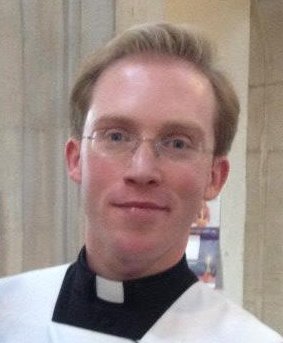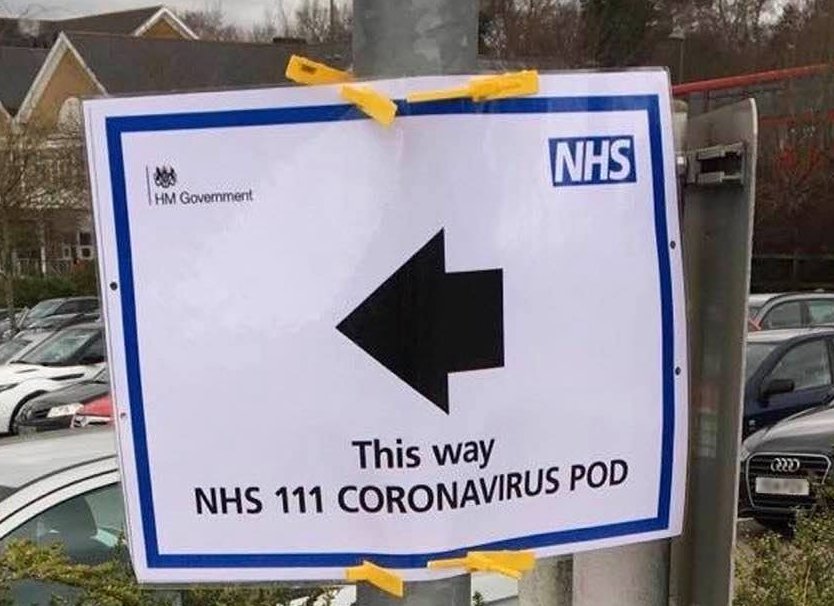 "Is this not the fast I choose?"
"Is this not the fast I choose?"
Living in a beautiful state. No matter what.
Fr Steven Young
Walking through the car park of Barnet hospital yesterday I passed this sign on the pavement saying "This Way. NHS 111. Coronavirus Pod"

Immediately, I stepped out into the middle of the road with the intention of walking as far away from the potentially Coronavirus infected walkway as possible – and narrowly escaped getting hit by the 263 bus.
If Olympic medals were handed out for overthinking about possible future miseries, I would win gold. I've imagined plenty of doomsday scenarios in the past few weeks. But, it was UNDER thinking about the needs of the present moment, such as not looking at what might be coming before stepping out into the middle of the road that nearly got me killed yesterday afternoon.
Which is ironic, as I was visiting the hospital to visit a woman who has taught me more about living in the present moment than anyone else. Before she was taken ill Mary prayed Morning Prayer daily at St Michael's. Every morning, as Mary leaves church, she always says to me, in her soft, poetic, Nigerian accent, "Have a beautiful day".
I've often pondered Mary's use of the word "beautiful", and yesterday I think I understood for the first time why she uses it. Mary has decided that no matter what happens to her, she is going to live in a beautiful state.
Mary reminds me that none of us, no matter what we do, or how hard we try to control things, can avoid the reality of pain in our lives: We will get ill. A loved one might be diagnosed with cancer. We may lose our job. We might get divorced. There may be war, economic instability, a pandemic. But as in-avoidable as all this pain is – we can still choose not to suffer. We can choose, like Mary, to live in a beautiful state no matter what happens to us.
In the New Testament reading for Ash Wednesday from 2 Corinthians chapter 5, St Paul entreats the early church to whom he is writing not to accept the grace of God in vain. He reminds them that our capacity to rejoice is not dependent on what happens to us. Neither is poverty dependent on material wealth. Through God's grace we can be poor yet possess everything. As servants of God we can commend ourselves through our endurance in such a way as we let no hardship diminish our rejoicing. We can decide to live in a beautiful state no matter what painful events happen to us.
Pain is inevitable. Suffering comes when we obsess about ourselves, what we're getting or not getting, what we should have done, or what others should have done for us. Suffering could be anger, frustration, worry, guilt, letting negative thoughts and emotions grow in our minds by feeding and dwelling on them rather than acknowledging them and letting them pass. Comparison is the thief of joy.
We can choose to think in a way that will render us in the weakest emotional state, or we can diminish our suffering by choosing to think in a way that gives us joy, life and hope.
The horrific realisation that struck me yesterday was that I was not so much scared of the coronavirus (or even death) as I was terrified of my own projection of how if my son and I get struck down with this disease I would be lying there sweating and filled with panic, guilt, remorse, responsibility and mortal terror because I would view what is happening to me as some kind of divine punishment for my sins.
Now when I say this out loud it seems so CRAZY, but you better believe the evangelical guilt is REAL. Incidentally, if you want disempower a crazy thought find someone you trust who is sensible enough to tell you it is complete rubbish and say it out loud to them. Acknowledge it – laugh at it with someone and don't let it run rampant in your head unspoken or unacknowledged. We all think really crazy stuff – and these kind of thoughts can get way too big in our heads, but thoughts have no power or meaning but the power or meaning we choose to give them.
I know all this from bitter experience because my emotional home is guilt. Whenever anything happens my brain will always find a way to get "home". If something tragic happens the first response I will feel is guilt – what could I have done that "made this happen"? My brain will ask. "What could I have done to STOP this happening". And if there is no logical practical consequence my brain will come up with a spiritual one – I'm a bad person – we are being punished. It's all MY fault.
Now does this way of thinking make me a better, more loving person? NOPE. It makes me fearful, selfish, angry, controlling, egotistical and perpetually overwhelmed by the weight of my own imagined responsibility for the pain of the world. Instead of making me more giving it renders a kind of ethical paralysis where I do much LESS for others than I ought.
I first reflected on this when I wondered why it is that families in the hospice who clearly love the person who dying are usually far less emotionally equipped to care for them in their last hours. A lot of this has to do with the paralysing effect of guilt. It is not a lack of empathy that is the problem but an overabundance of empathy for the one they love coupled with an often unacknowledged sense of guilt for how they have not expressed this love as they should and a wonder how in these last hours they can ever make up for the privations of the past. I want to scream out "don't let your guilt and fear rob you of the joy of being present!" but I know from my own life how much I struggle to be present to others, and even myself, for exactly the same reasons.
If Ash Wednesday makes us feel guilty and introspective in a way that sabotages kindness, generosity, presence and spiritual growth then it is a complete waste of time. We'd be better off doing almost ANYTHING else. Go bowling. Go for a walk in the park. Eat another pancake. Anoint your face with oil.
This Lent I believe God is calling each of us to make the decision to live in a beautiful state – no matter what. "Is this not the fast I chose?" Isaiah prophesies. To loose the bonds of injustice. To undo the thongs of the yoke. To let the oppressed go free and break every yoke. We live the fast God choose when we stop focusing on ourselves but choose to serve something greater than ourselves. To share our bread with the hungry, bring the homeless poor into our houses and clothe those who are rendered naked, through spiritual, emotional or physical vulnerability. The fast God chooses is that we do not our fear, guilt and shame cause us to hide ourselves from our own kin and the reality of our shared humanity and our equal worth in God's eyes.
As the cross of ashes is etched on our foreheads we are reminded that life is short. We are dust and to dust we shall return. We do not know how short our lives are going to be. All the riches in the world cannot predict the future and perhaps in these uncertain times we feel the reality of this all the more acutely.
If we knew we only had a week to live I bet we wouldn't allow ourselves to suffer over the little rubbish that makes us crazy normally. The petty frustrations and annoyances, the worries over our own perceived inadequacy, the fears for a future we can neither control nor predict. I think if you knew you only had a week to live you'd probably spend time with those you love. You do what you love. You take in a sunset. You'd smell the air. You'd take in everything in these final moments that you possibly could. You would love, serve and experience like you've never loved, served or experienced before.
God's question is; WHY WAIT?
"See, now is the acceptable time; see, now is the day of salvation."
A coward dies a thousand deaths - a courageous woman or man dies only once. Be the courageous person not the coward. Choose to die only once. Live in the power of the Resurrection.
You are made in the image of Christ. You are made in the image of one who even as He was hanging from the cross chose not to obsess about Himself and His pain but to prioritise the needs of others; to make an adopted family bound together by love; to pray for those who were killing Him to know God's forgiveness, to proclaim the assurance of salvation to a penitent thief. All this was done while Christ hung from the cross.
So no matter what our crosses, we too can choose to live in the courageous, beautiful state Christ shows us. Make the decision to live in this beautiful state to which you are called. Know that when you feel anger, frustration, guilt, sadness, loss, which we all inevitably will so many times in our lives, know that you can choose NOT to stay there. You can choose instead to live and think in a way that will empower you not only to serve others as a disciple of Christ but strengthen you to better face all the pain and uncertainty of this mortal life in the sure and certain knowledge that this all WILL PASS.
What can never be taken away is the fact that you are loved.
You are forgiven. You are redeemed. You are saved by Christ who triumphed over death once and for all time on the cross.
So be of great courage. Live in the power of Christ's Resurrection.
"Have a beautiful day."
